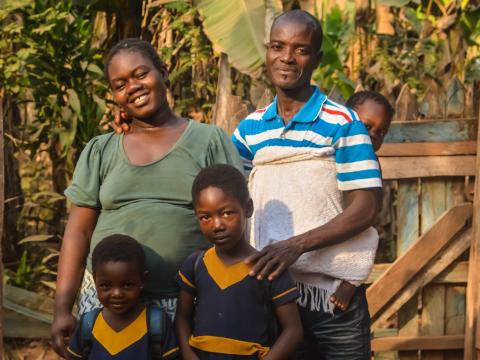Diversity Matters

Tettey, 40, expected many things from World Vision’s “Nutrition Links” programme when it came to his home area of Mensah Dawa. But, he didn’t expect it to transform his life and the lives of his wife and three children in quite the way it has. Nor did he think it would turn him into a leader in a new appreciation of men and women’s roles in his community in Upper Manya Krobo District.
Tettey’s wife, Mamle, 25, says the first signs of change came after her husband attended three “gender and diversity” trainings, organised for their community. “Now, whenever I am busy cooking in the morning, my husband will always help to prepare the kids for school,” she says. “The Gender and Diversity programme has really influenced my husband and changed the way things are done in my community,” she added.
Working Together
Tettey and Mamle raise their children in a rural community where every action and attitude is scrutinised by neighbours. This situation can lead to mockery, but it also makes positive lessons more powerful. Helping out with household chores, or taking care of the children, were traditionally seen as “women’s duties”. These, along with fetching water, preparing food, shopping at the market, mending clothes, and a range of other work, were tasks reserved for women.
Tettey explains the logic which led him to share out these tasks more equitably: “Helping my wife with household chores reduces the time she spends doing them and that gives her time to rest,” he says. Mamle is not as tired as she was before and this enables them to spend more time together as a couple and helping the children with their homework. She stands up for Tettey when others in the community make fun of him.
“Men in the community always tease him when they see him helping in household chores or carrying his youngest child on his back. Some even try to talk him out of it. But, he explains to them that he is determined not to be influenced by them because he knows it is the right thing to do,” says Mamie.
In fact, the area chief, known as the Dademantse, is a man called Quist. He, too, went through the training and believes it is time for men and women to examine the traditional roles they play. Before the training, he and his elders spent most evenings settling disputes among couples, he recalls. Since the training, couples no longer come to settle disputes.
“The Gender and Diversity training has brought peace to many homes," says Quist." "When a man helps his wife, she is satisfied and this reduces quarrels in a lot of homes. The woman is also able to rest, which is good for her health.”
Leading by Example
Dademantse Quist has visibly modelled the behaviour he recommends, sharing in washing dishes and doing the laundry with his wife, Gladys. When a couple is arguing, he invites them to come and see how he helps his wife around their household and on the farm, and learn from him.
This programme was made possible through our partnership with Global Affairs Canada. Learn more about how World Vision partners with like-minded organizations across West Africa and see the impact working together is having here.